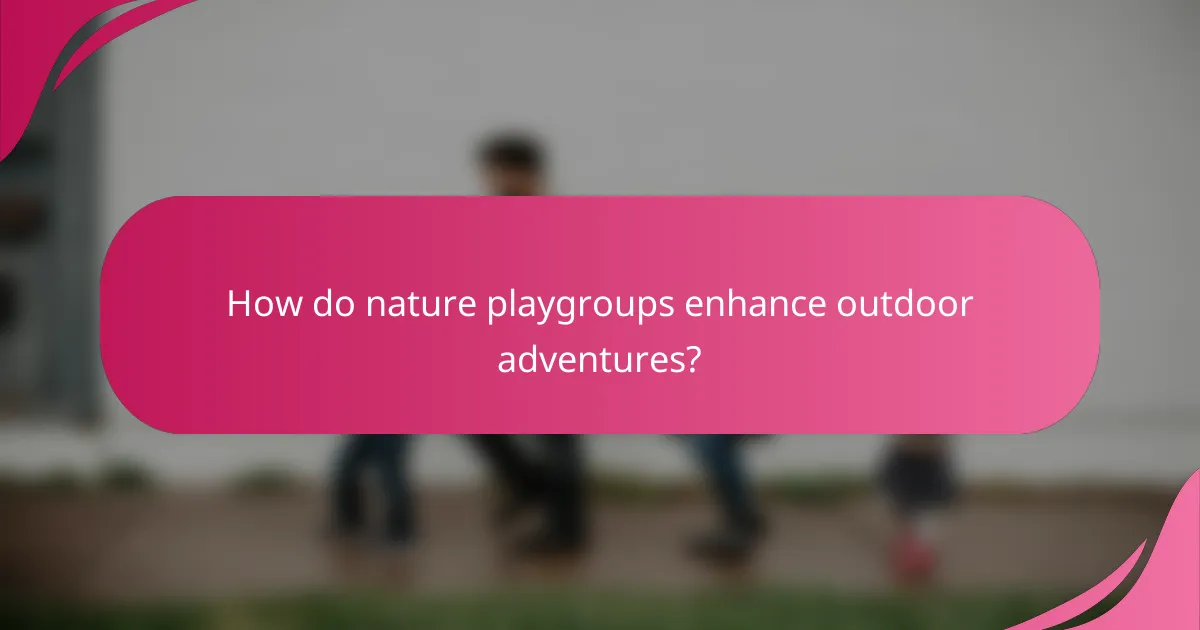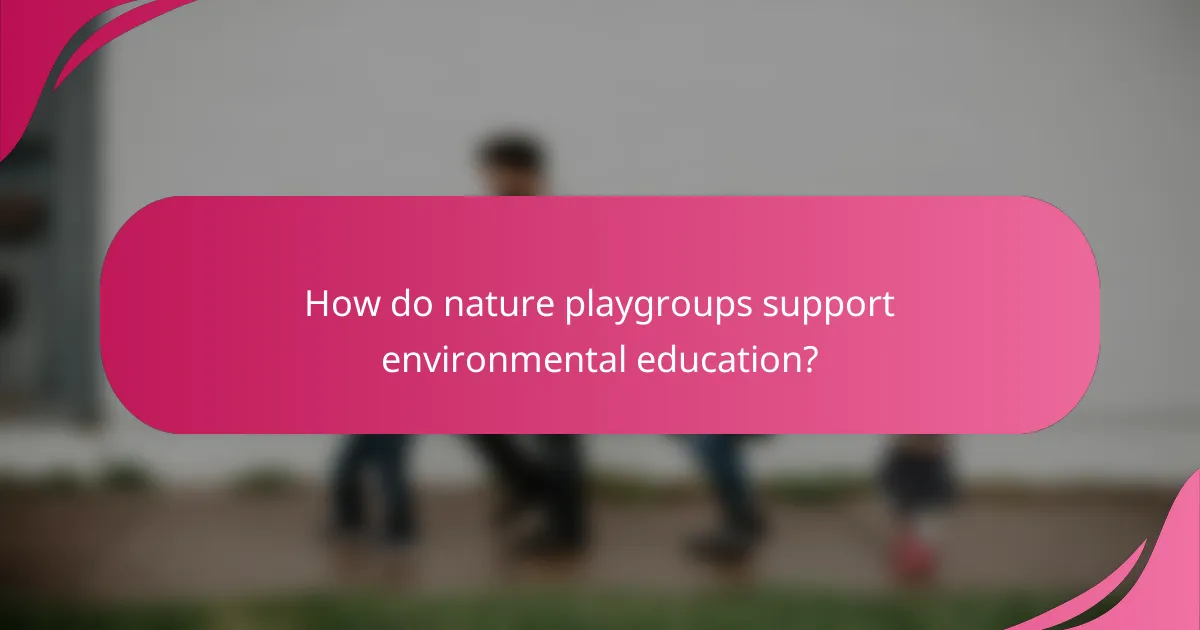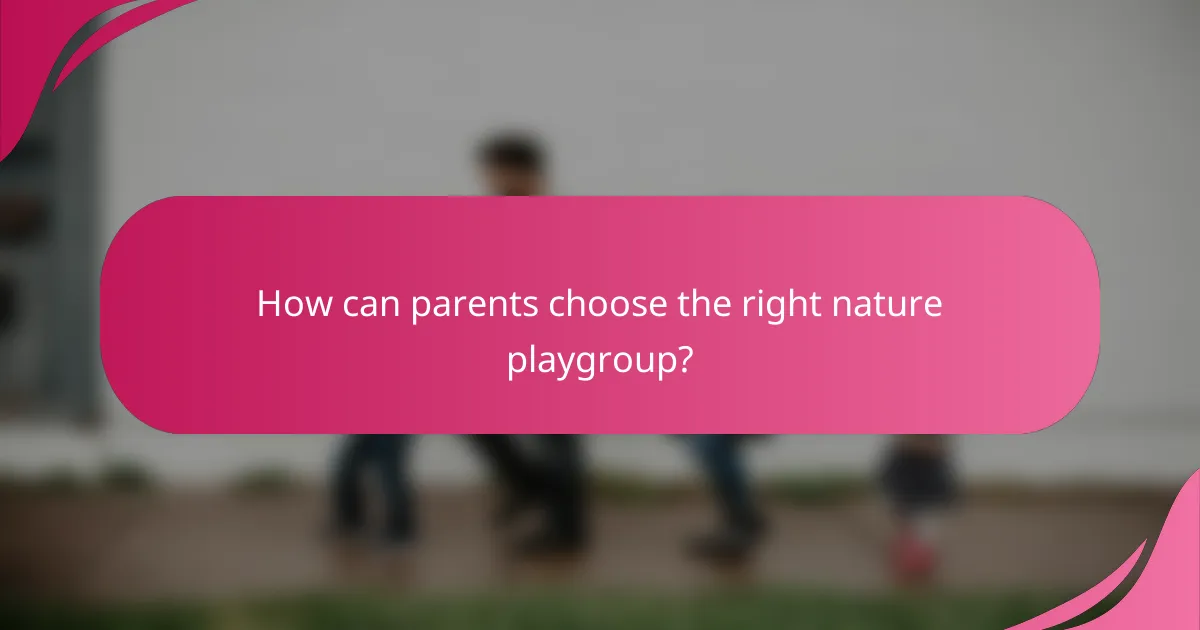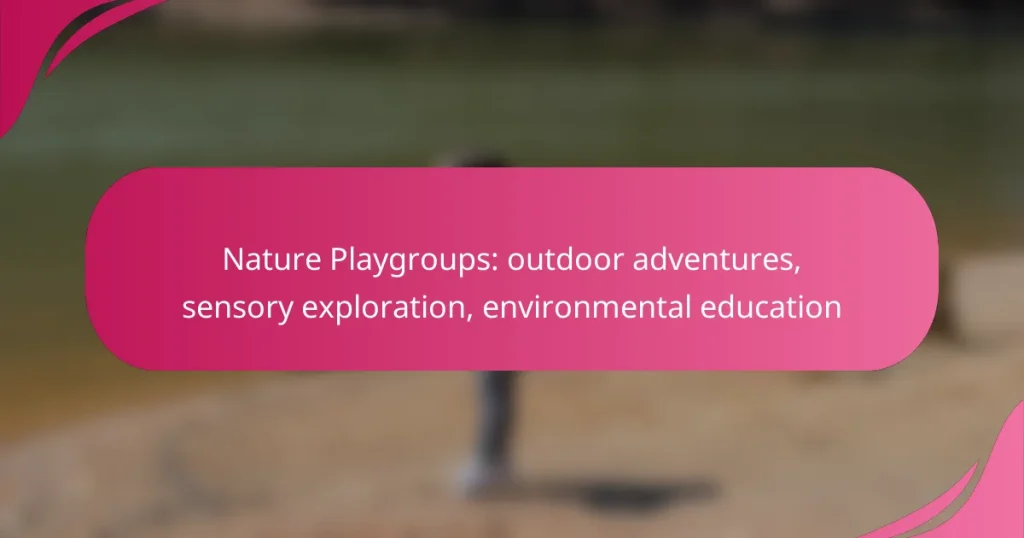Nature playgroups offer children the chance to embark on outdoor adventures that promote unstructured play and creativity in natural environments. Through sensory exploration activities, kids engage their senses and develop a deeper connection to the world around them. Additionally, these groups provide valuable environmental education, immersing children in ecosystems and fostering a sense of stewardship for the planet.

How do nature playgroups enhance outdoor adventures?
Nature playgroups significantly enhance outdoor adventures by providing children with opportunities to engage in unstructured play in natural settings. These groups encourage exploration, creativity, and physical activity, all while fostering a connection to the environment.
Encouraging physical activity
Nature playgroups promote physical activity by allowing children to run, climb, jump, and explore diverse terrains. Activities such as hiking, playing in streams, or climbing trees help develop gross motor skills and overall fitness.
Parents and caregivers can facilitate this by organizing regular outings in parks or nature reserves, ensuring a variety of environments to keep children engaged. Aim for at least one outing per week to maximize physical benefits.
Fostering social interactions
These groups create a social environment where children can interact, collaborate, and build friendships. Engaging in group activities like scavenger hunts or nature crafts encourages teamwork and communication skills.
To enhance social interactions, consider setting up small group challenges or games that require cooperation. This not only strengthens bonds among peers but also helps children develop conflict resolution skills in a supportive setting.
Promoting exploration of natural environments
Nature playgroups encourage children to explore their surroundings, fostering curiosity and a sense of wonder about the natural world. Activities such as identifying plants, observing wildlife, or collecting natural materials for crafts deepen their understanding of ecosystems.
To promote exploration, provide children with simple tools like magnifying glasses or field guides. Organizing themed exploration days can also enhance their learning experience, making nature both fun and educational.

What sensory exploration activities are included?
Sensory exploration activities in nature playgroups engage children through hands-on experiences that stimulate their senses. These activities often include elements like sight, sound, touch, and smell, allowing kids to connect with their environment in meaningful ways.
Nature scavenger hunts
Nature scavenger hunts encourage children to explore their surroundings while searching for specific items like leaves, rocks, or insects. This activity promotes observation skills and fosters curiosity about the natural world.
To organize a scavenger hunt, create a simple checklist of items for children to find. You can tailor the list based on the local environment, ensuring it includes items that are easily accessible and safe to collect.
Texture and sound exploration
Texture and sound exploration activities allow children to engage with various natural materials, enhancing their sensory awareness. Kids can touch different surfaces like bark, grass, and stones while listening to sounds like rustling leaves or chirping birds.
Set up stations with different textures and sound sources, encouraging children to describe what they feel and hear. This can be done in a forest, park, or even a backyard, making it adaptable to various settings.
Water play and mud activities
Water play and mud activities provide sensory-rich experiences that are both fun and educational. Children can splash, pour, and mold, which helps develop fine motor skills while exploring concepts like volume and texture.
To facilitate these activities, designate a safe area where kids can play with water and mud. Consider using buckets, cups, and natural materials like sticks or stones to enhance their play experience. Always supervise children closely to ensure safety during these activities.

How do nature playgroups support environmental education?
Nature playgroups enhance environmental education by immersing children in outdoor settings where they can learn about ecosystems, conservation, and wildlife. These experiences foster a deep connection to nature, encouraging stewardship and awareness of environmental issues.
Teaching conservation principles
Nature playgroups introduce children to conservation principles through hands-on activities and discussions about resource management. Activities like planting trees or creating compost help illustrate the importance of sustainability and the impact of human actions on the environment.
For example, children can learn about reducing waste by participating in recycling projects or observing the benefits of native plants in their local areas. This practical engagement reinforces the concept that everyone can contribute to environmental protection.
Understanding local ecosystems
Through exploration and observation, nature playgroups help children understand local ecosystems and their components. Activities such as nature walks or habitat building allow children to discover the relationships between plants, animals, and their environments.
By identifying local flora and fauna, children gain insights into biodiversity and the roles different species play in maintaining ecological balance. This knowledge fosters a sense of responsibility towards preserving their local habitats.
Engaging with wildlife
Engaging with wildlife is a crucial aspect of nature playgroups, as it provides children with direct experiences that deepen their understanding of living organisms. Activities like birdwatching or insect exploration encourage curiosity and respect for wildlife.
Children learn to observe animals in their natural habitats, which can lead to discussions about animal behavior, habitats, and conservation needs. Such interactions promote empathy and a desire to protect wildlife and their environments.

What are the prerequisites for joining a nature playgroup?
Joining a nature playgroup typically requires meeting certain age criteria, ensuring parental involvement, and considering location accessibility. These prerequisites help create a safe and engaging environment for children to explore nature and learn.
Age requirements for participants
Most nature playgroups cater to children aged between 2 to 6 years, though some may accept older or younger children depending on the program’s structure. It’s essential to check with individual groups, as age limits can vary widely.
Some playgroups may offer specific sessions for different age ranges, allowing for tailored activities that suit developmental stages. This ensures that all participants can engage meaningfully with the environment and each other.
Necessary parental involvement
Parental involvement is often a key requirement in nature playgroups, as caregivers are usually expected to accompany their children during sessions. This participation not only enhances the child’s experience but also fosters a supportive community among parents.
Some groups may offer opportunities for parents to take on volunteer roles, such as leading activities or assisting with logistics. Engaging actively in these ways can deepen the connection to the playgroup and enrich the overall experience for both children and adults.
Location accessibility considerations
When selecting a nature playgroup, consider the accessibility of the location. Groups should ideally be situated in safe, natural environments that are easy to reach by foot, car, or public transport. Accessibility can significantly impact participation rates and the overall experience.
Additionally, check if the location has necessary facilities, such as restrooms and shaded areas, to accommodate young children and their caregivers. Ensuring that the site is welcoming and safe for all participants can enhance the enjoyment and learning opportunities during outdoor adventures.

How can parents choose the right nature playgroup?
Parents can choose the right nature playgroup by considering program structure, safety measures, and the qualifications of facilitators. These factors ensure that the playgroup provides a safe, engaging, and educational outdoor experience for children.
Evaluating program structure
When evaluating program structure, look for a balance between free play and guided activities. A well-structured nature playgroup should include a variety of sensory exploration opportunities, such as nature walks, art projects using natural materials, and group games that promote teamwork.
Consider the duration and frequency of sessions as well. Many nature playgroups operate on a weekly basis, with sessions lasting between one to three hours, allowing children ample time to engage with their surroundings.
Assessing safety measures
Safety measures are crucial in any nature playgroup. Check if the program has clear guidelines for outdoor safety, including protocols for weather conditions, first aid availability, and emergency procedures. A good playgroup should also maintain appropriate adult-to-child ratios to ensure supervision.
Additionally, inquire about the location’s natural hazards, such as water bodies or steep terrain, and how these are managed during activities. Programs that conduct regular risk assessments demonstrate a commitment to child safety.
Checking for qualified facilitators
Qualified facilitators are essential for a successful nature playgroup. Look for individuals with backgrounds in early childhood education, environmental science, or outdoor leadership. Certifications in first aid and CPR are also important indicators of a facilitator’s preparedness.
Engagement in ongoing training or workshops related to nature education can further enhance a facilitator’s ability to provide enriching experiences. Ask about their experience with children and their approach to fostering a love for nature.

What are the benefits of nature playgroups in urban areas?
Nature playgroups in urban areas provide children with essential opportunities for outdoor adventures, sensory exploration, and environmental education. These groups foster a connection to nature while promoting social interaction and community engagement.
Access to green spaces
Nature playgroups facilitate access to green spaces, which are often limited in urban settings. These groups encourage families to explore local parks, gardens, and natural reserves, enhancing children’s physical activity and appreciation for the environment.
Engaging with nature can improve children’s well-being and cognitive development. Activities such as climbing trees, playing in the dirt, or observing wildlife stimulate their senses and promote creativity.
Community building opportunities
Nature playgroups serve as a platform for community building, bringing together families with shared interests in outdoor activities and environmental stewardship. Participants can form lasting friendships and support networks, enhancing social cohesion in urban neighborhoods.
These groups often organize events, workshops, and volunteer opportunities that strengthen community ties. Parents can collaborate on projects that benefit local green spaces, fostering a sense of ownership and responsibility for their environment.


